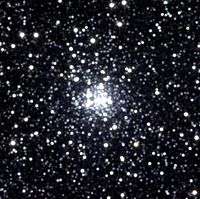NGC 6304
| NGC 6304 | |
|---|---|
|
Credit: 2MASS | |
| Observation data (J2000.0 [1] epoch) | |
| Class | VI [2] |
| Constellation | Ophiuchus [3] |
| Right ascension | 17h 14m 32.25s [1] |
| Declination | −29° 27′ 43.3″ [1] |
| Distance | 19.2 kly [2] |
| Apparent magnitude (V) | 9.03 [1] |
| Physical characteristics | |
| VHB | 16.25 [4] |
| Metallicity |
![\begin{smallmatrix}\left[{Fe}/{H}\right]\end{smallmatrix}](../I/m/48bb1fd025ac5d26d6e49ed60b764646.png) = -0.45 [4] dex = -0.45 [4] dex |
| Estimated age | ~12.3 Gyr[5] |
| Other designations |
Bennett 90,[3] |
NGC 6304 is a globular cluster in the constellation Ophiuchus. William Herschel discovered this star cluster using an 18.5-inch (47 cm) f/13 speculum reflector telescope in 1786.[3] It is about 19,000 light-years away, near the Milky Way's central bulge.[7]
See also
References
- 1 2 3 4 5 6 7 8 9 "NGC 6304". SIMBAD. Centre de données astronomiques de Strasbourg. Retrieved 2012-08-18.
- 1 2 "NGC 6304". SEDS. Retrieved 2012-08-18.
- 1 2 3 4 5 6 "NGC 6304". Deep Sky Observer's Companion on-line database. Retrieved 2012-08-17.
- 1 2 "NGC 6304". A Galactic Globular Cluster Database. Version 11.12. Retrieved 2012-08-18.
- ↑ Forbes, D. A.; Bridges, T. (2010). "Accreted versus in situ Milky Way globular clusters". Monthly Notices of the Royal Astronomical Society 404 (3): 1203–1214. arXiv:1001.4289. Bibcode:2010MNRAS.404.1203F. doi:10.1111/j.1365-2966.2010.16373.x.
- ↑ "NGC 6304". NASA/IPAC Extragalactic Database. Retrieved 2012-08-18.
- ↑ Crossen, C.; Rhemann, G. (2004), Sky Vistas: Astronomy for Binoculars and Richest-Field Telescopes, Springer-Verlag, p. 254, ISBN 3-211-00851-9
External links
This article is issued from Wikipedia - version of the Tuesday, February 10, 2015. The text is available under the Creative Commons Attribution/Share Alike but additional terms may apply for the media files.
